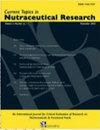Amarogentin通过调节软骨细胞增殖和自噬减轻骨关节炎
IF 0.4
4区 医学
Q4 NUTRITION & DIETETICS
Current Topics in Nutraceutical Research
Pub Date : 2023-07-07
DOI:10.37290/ctnr2641-452x.21:254-259
引用次数: 0
摘要
虽然amarogentin已被证明在几种疾病状态中发挥改善作用,但其在骨关节炎进展中的作用仍未被探索。为此,我们研究了amarogentin在白细胞介素-1β处理的软骨细胞(骨关节炎的细胞模型)中的作用。我们观察到白细胞介素-1β治疗后软骨细胞增殖减弱,而阿霉素治疗逆转了这一趋势。此外,白细胞介素-1β处理后,基质金属蛋白酶-3和基质金属蛋白酶-9蛋白表达增强,胶原II蛋白表达减少,但苦蒿素处理逆转了这些变化,表明苦蒿素抑制了白细胞介素-1β刺激的细胞外基质降解。此外,amarogentin通过提高LC3II/LC3I、Beclin1和Atg7的水平和降低P62的水平来增强白细胞介素-1β触发的软骨细胞自噬,P62是一种与自噬底物相互作用并将其递送到自噬体降解的转运蛋白。此外,白细胞白素-1β处理后,p-AMPK/AMPK和SIRT1蛋白的表达降低,而苦蒿素处理后,这些作用得以恢复,说明苦蒿素激活了AMPK/SIRT1通路。综上所述,amarogentin通过AMPK/SIRT1通路调节软骨细胞增殖和自噬,从而缓解骨关节炎。本文章由计算机程序翻译,如有差异,请以英文原文为准。
Amarogentin Alleviates Osteoarthritis by Regulating Chondrocyte Proliferation and Autophagy
Although amarogentin has been shown to play an amelioration role in several disease states, its role in osteoarthritis progression remains unexplored. To this end, we have examined the role of amarogentin in interleukin-1β-treated chondrocytes, a cell model of osteoarthritis. We observed that chondrocyte proliferation was attenuated after interleukin-1β treatment, which was reversed by amarogentin treatment. In addition, the protein expressions for matrix metalloproteinase-3 and matrix metalloproteinase-9 were enhanced, and collagen II was reduced after interleukin-1β treatment, but these changes were reversed by amarogentin treatment, indicating that amarogentin inhibited interleukin-1β-stimulated extracellular matrix degradation. Moreover, amarogentin strengthened interleukin-1β-triggered chondrocyte autophagy by enhancing LC3II/LC3I, Beclin1, and Atg7 levels and reducing the level of P62, a cargo adaptor protein that interacts with autophagic substrates and delivers them to autophagosomes for degradation. Besides, the expressions of p-AMPK/AMPK and SIRT1 proteins were diminished after interleukin-1β treatment, but these effects were restored by amarogentin treatment, illustrating that amarogentin activated the AMPK/SIRT1 pathway. In conclusion, amarogentin alleviates osteoarthritis by regulating chondrocyte proliferation and autophagy through the AMPK/SIRT1 pathway.
求助全文
通过发布文献求助,成功后即可免费获取论文全文。
去求助
来源期刊
CiteScore
1.10
自引率
0.00%
发文量
36
审稿时长
>12 weeks
期刊介绍:
Current Topics in Nutraceutical Research is an international, interdisciplinary broad-based peer reviewed scientific journal for critical evaluation of research on chemistry, biology and therapeutic applications of nutraceuticals and functional foods. The major goal of this journal is to provide peer reviewed unbiased scientific data to the decision makers in the nutraceutical and food industry to help make informed choices about development of new products.
To this end, the journal will publish two types of review articles. First, a review of preclinical research data coming largely from animal, cell culture and other experimental models. Such data will provide basis for future product development and/or human research initiatives. Second, a critical evaluation of current human experimental data to help market and deliver the product for medically proven use. This journal will also serve as a forum for nutritionists, internists, neurologists, psychiatrists, and all those interested in preventive medicine.
The common denominator of all of the topic to be covered by the journal must include nutraceuticals and/functional food. The following is an example of some specific areas that may be of interest to the journal. i) Role of vitamins, minerals, antioxidants and phytonutrients on cardiovascular health, cancer, diabetes, ocular health, mental health, men’s health, women’s health, infant nutrition, ii) Role of herbals on human health, iii) Dietary supplements and sleep, iv) Components of diet that may have beneficial effect on human health, v) regulation of apoptosis and cell viability, vi) Isolation and characterization of bioactive components from functional foods, vii) Nutritional genomics, and viii) Nutritional proteomics.

 求助内容:
求助内容: 应助结果提醒方式:
应助结果提醒方式:


